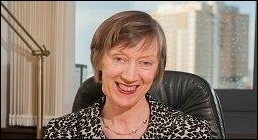
Dr Evelyn Collins CBE, Chief Executive of the Equality Commission NI, looks at progressing women's equality in Northern Ireland.
I chaired an event recently that focussed on the significant work going on across Northern Ireland relating to the United Nations Convention for the Elimination of Discrimination Against Women (
CEDAW) - an international human rights treaty dealing with equality between women and men in all areas of life.
The United Nations Committee, which monitors how countries are fulfilling their obligations under CEDAW, will be conducting a formal examination of the United Kingdom in February 2019. The Committee, meeting in Geneva, will examine what steps the Government has taken to meet its obligations under CEDAW, including the position in Northern Ireland.
The event, which took place in Belfast, was very well attended with representation from a wide range of organisations involved with and working on behalf of women in Northern Ireland. We heard from MLAs Megan Fearon and Carla Lockhart and from Carol McCabe from the Department for Communities. The keynote speaker was Professor Ann Marie Gray from the University of Ulster. They each presented their own perspective on the importance of CEDAW and of working to advance gender equality in Northern Ireland.
The Commission, along with the Northern Ireland Human Rights Commission, and organisations such as the Northern Ireland Women’s European Platform, have a key role in holding Government to account under CEDAW. As part of this process, each have developed and submitted Shadow Reports to help inform the UN Committee during its examination of Government. Speakers from each organisation – Roisin Mallon, Hannah Russell and Louise Kennedy - presented the main issues from these Shadow Reports to the meeting.
Each organisation, in preparing their Shadow Reports, spoke to women across Northern Ireland about the equality issues that affect them. Their input ensures that their voices will be heard and it has helped us all to shape our respective shadow reports. They set out clearly what we see as the priority equality issues affecting women in Northern Ireland to be addressed by Government. A number of themes were common across the reports – on issues around women’s economic independence, their participation in public life and peacebuilding.
It is regrettable that the continued lack of a devolved administration here impacts significantly on the ability to progress change in Northern Ireland, including the prospects of advancing gender equality.
In addition, as the United Kingdom prepares to exit the European Union, we are currently in the midst of one of the greatest political challenges of our times. There is still uncertainty about what form this will take and what impact it will have on Northern Ireland.
The Equality Commission’s position has been clear. The Government must ensure there is no regression from the hard won protections enshrined in our equality law including those affecting the rights of women. We have also sought a commitment that Government will keep pace with future advances in equality law so that we do not lose the momentum of evolving and advancing equality rights for the future.
We will continue to work with public sector organisations to help ensure that, through the Section 75 equality duties, women’s equality issues are mainstreamed across public policy. Gender equality considerations should be woven into the development and implementation of policy, and not just tacked on as an afterthought.
While we recognise that there is a lot of good work going on to progress women’s equality - in government departments, local councils, trade unions and by employers in the public and the private sectors – it is also clear that more progress could and should be made. The Commission works with public sector organisations to assist them use tools such as impact assessment and equality budgeting. Opportunities to promote women’s equality can arise in many ways, such as through public procurement, or with increased use of positive action and temporary special measures where these are appropriate.
The Commission has kept women’s equality as a key focus of our work last year as in previous years. Our current
draft corporate plan for 2019 – 2022 proposes that it remains a priority focus for the coming period too. But we cannot do this alone –we recognise the need for a strong common vision for women’s equality in Northern Ireland. Ten years of austerity has limited the options for many groups providing vital services to women. Such groups have faced reduced budgets, reduced staffing levels, and have had to prioritise the areas where they can work to affect change – this adds up to tough times for all.
We have called for the development of an effective and operative gender equality strategy for Northern Ireland and for a strategic framework aimed at ensuring Government’s compliance with CEDAW obligations and the UN Sustainable Development Goals.
We look forward to the next steps in the
CEDAW process. We will be raising these priority issues affecting women with Committee members in advance of the Committee’s formal examination of the United Kingdom on 26 February in Geneva.
Ongoing engagement and collaborative work will be essential to ensure that any recommendations arising from the United Nations Committee’s examination of the United Kingdom – its Concluding Observations - are given effect in Northern Ireland. Working together, despite all the challenges, we can protect and further advance women’s equality.
Further information
Posted on 06 Feb 2019 by
Evelyn Collins CBE